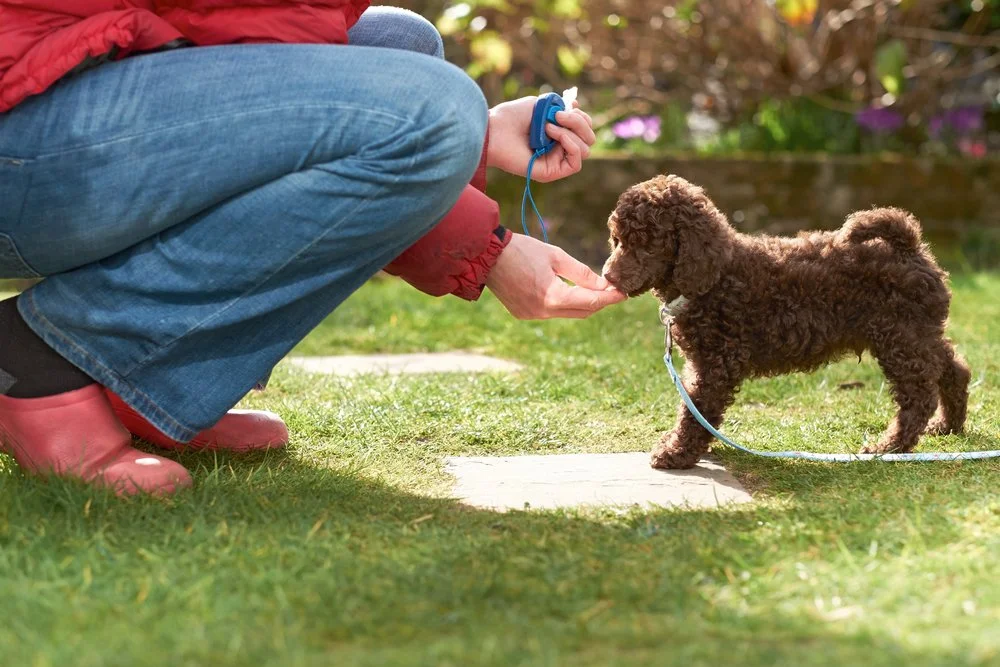What Dog Trainers Say NOT to Do When Training a New Puppy
When it comes to puppy training, pet parents generally have the best intentions. But according to experienced Portland dog trainers, many people make mistakes that derail their efforts to teach basic obedience.
Puppy training can be rather challenging, and while you can easily find information on what to do when working with a new pup, dog trainers say that knowing what not to do is just as important. For an easier time helping your furry friend become an obedient and well-adjusted pet, heed the words of advice below.
Don’t Hold Off on Puppy Training
Bringing a new pup into the family is exciting, and it’s easy to get caught up in the fun of having a furry friend around. Many Portland pet parents put off training until later on, and that’s a mistake – dog trainers say that the earlier you train a puppy, the more quickly they tend to learn new skills and behaviors.
Don’t Take an Erratic Approach
Just like kids who are taking piano lessons or learning to speak a second language, regular practice is essential for a puppy who needs to learn how to behave. Portland dog trainers report that pet parents who train inconsistently, working with a new pup one day, but not the next, get results that are far from optimal.
Don’t Overuse Command Words
While command words like sit, stay, come and down are important for a new pup to learn, professional dog trainers warn that repeating them too many times in a row can create a problem. Sometimes, the repetition can lead to a puppy only responding when a command is given over and over again.
Don’t Create Command Confusion
Saying one thing and doing another is never a good idea. But pet parents take this strategy quite often, using the “come” command and then, instead of offering the expected reward, doing something the puppy dislikes, such as clipping their nails. After this, the pup is typically either confused or unwilling to respond.
Don’t Misuse the Dog Crate
A crate is supposed to be a safe and comforting place for a puppy, a spot where they can relax at night and when their pet parents leave the house. Dog trainers advise against putting a pooch in a crate as a punishment or for no reason at all, as doing so can lead to issues with anxiety or anger.
Don’t Give Too Many Treats
Using food helps build engagement with a dog, ensuring that they’re actively participating in training, but providing a pooch with an abundance of treats puts them at risk for packing on the pounds. Food rewards should be offered at a regularly scheduled mealtime, and dog trainers state that extra nibbles should be limited.
Don’t Show Negative Emotions
Experienced Portland dog trainers know how frustrated pet parents feel when their new pup doesn’t seem to be catching on to the concepts being taught. Showing irritation or anger is inadvisable, as giving way to these emotions can hinder the training process and may even lead to aggressive behavior.
Don’t Train in Just One Place
When starting off with puppy training, staying within the home and working in a distraction-free area is best. However, dog trainers make it clear that pet parents need to gradually broaden their pup’s horizons and train elsewhere, too, as our furry friends should learn how to behave in busier environments.
Don’t Scold After the Fact
Potty training is difficult, but dog trainers say that reprimanding is only appropriate when a pup is caught in the act of eliminating in the wrong spot. Scolding later, upon seeing a mess on the floor, can make a puppy think that waste being present makes people angry, which can make them become secretive about pottying.
Don’t Be Unpredictable
Portland dog trainers realize that a routine helps create confidence in a puppy. It’s essential to establish a reliable schedule for feeding, eliminating, walking, playing and training. When pet parents don’t develop a routine early on – or when they let the routine slide – it often leads to accidents and behavioral mishaps.
Don’t Hype the Happenings
Anyone who stages a dramatic scene or acts emotional whenever they leave the house or get back home isn’t doing their pup any favors. Exaggerated greetings and departures often make a dog become agitated every time the door is used, and the practice can encourage a habit of barking later in life.
Don’t Give Up on Puppy Training
Training strategies that work with one dog may not work with another. Sometimes, pet parents need to try a few different methods before landing on one that allows their pup to succeed. Taking a one-size-fits-all approach leads to disappointing results, but in that event, calling a dog trainer is better than throwing in the towel.
Do you need help with puppy training? If you live in Portland or the nearby northwest Oregon area, turn to the professional team at Blackwood Canine. Our highly skilled dog trainers have been working with pups and adult pooches for more than a decade, and we know how to effectively train dogs of all breeds and dispositions.
For details on the puppy training programs we offer at Blackwood Canine, or to schedule a consultation with one of the best Portland dog trainers, contact our office today.

